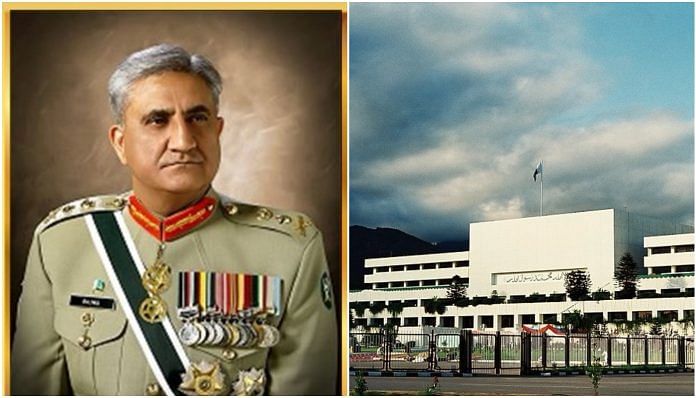As no official statement was issued after the extraordinary Senate briefing by the army leadership, all sorts of speculations were made and the military spokesman was busy issuing denials.
Visits by Pakistani military chiefs to the country’s parliament are rare. But when the chief addresses thorny issues like civil-military balance, things have a way out of leaking out of the rarefied walls.
The excitement about Pakistan Army chief General Qamar Javed Bajwa’s maiden visit to the Senate was so high that some senators rushed to reveal information to the media about the in-camera briefing, and even got reprimanded by Senate chairman Mian Raza Rabbani.
The briefing by Gen. Bajwa, Inter-Services Intelligence (ISI) head Lt Gen. Naveed Mukhtar and Director General Military Operations (DGMO) Maj. Gen. Sahir Shamshad Mirza was supposed to be a closed door meeting of 104 senators in the Senate’s “Committee of the Whole”.
But Rabbani, of the Pakistan Peoples Party (PPP), was so upset by the leaks to the media that he ordered evolving a code of conduct to guard against violation of secrecy in future. Nobody would trust the lawmakers if they divulged secret information, he warned.
One senator from the ruling Pakistan Muslim League-Nawaz (PML-N) was singled out for telling journalists that the army chief had even offered to resign, if the so-called ‘khaki patronage’ to the recent 21-day sit-in by Islamic radicals in Islamabad was proved.
Gen. Bajwa was also quoted as saying that the military had no desire for a supra-constitutional role, or to destabilise the civilian government. He even said that the presidential system of government weakened the federation of Pakistan.
The last such visit was in May 2011, when the former Army chief Gen. Ashfaq Parvez Kayani, along with the ISI Director General Lt Gen. Ahmed Shuja Pasha, briefed a joint session of parliament about the Abbottabad operation killing Osama bin Laden.
The incident had humiliated Pakistan, and the government and the powerful military were under pressure to answer questions. Another such briefing to the joint session of parliament was given by the then-DGMO Maj. Gen. Javed Iqbal in May 2009, soon after the launch of a major military operation against the militants in Swat.
Some lawmakers have repeatedly accused the army of overstepping its mandate, and keeping the democratically-elected government perpetually under pressure. The civil-military relations in Pakistan are lopsided with half of the nation’s life ruled by the military.
Speculation and denial
As no official statement was issued after the extraordinary Senate briefing by the army leadership, all sorts of speculations were made, and the military spokesman was busy issuing denials.
One controversial comment Gen. Bajwa made was to tell politicians not to tempt the army by offering it a chance to intervene. It remains a fact that disgruntled opposition politicians have been inviting the army generals to seize power, as their primary aim is to topple the sitting government of their political rivals. On social media and on street banners in Islamabad, there were even pleas made to the previous Army chief Gen. Raheel Sharif to stop talking about retirement and take charge of the government instead.
Gen. Bajwa also said that the military was ready to support the political leadership in normalising relations with India. He also said that Pakistan will not let Iran and Saudi Arabia go to war, as part of its joining the 41-nation Saudi-led Islamic military alliance.
However, there was one positive outcome of the army chief’s visit to the Senate. Many of his utterances appear to have cleared the political uncertainty buzzing in Pakistan.
A number of conspiracy theories were making the rounds that the PML-N-led federal government was on its way out because the military was unhappy with its working and concerned about the poor state of the economy. Deposed Prime Minister Nawaz Sharif’s belligerent statements against the ‘hidden hands’ disqualifying him through the Supreme Court had created bitterness and weakened the position of his hand-picked successor Shahid Khaqan Abbasi.
National Assembly Speaker Sardar Ayaz Sadiq, close to Nawaz Sharif, even said that the assemblies may not complete the five-year term ending in May 2018.
These may have died down now. But in Pakistani politics, the next round of conspiracy theories is always just around the corner.
Rahimullah Yusufzai is Resident Editor of the English Daily, The News International, in Peshawar, Senior Analyst for Pakistani TV channel, Geo, and a correspondent for BBC World Service since 1985. He has covered the Afghan conflict extensively, has interviewed Osama bin Laden and Mullah Omar. A graduate in English Literature from Karachi University, Yusufzai had been part of Track-II dialogues with Afghanistan and India.



